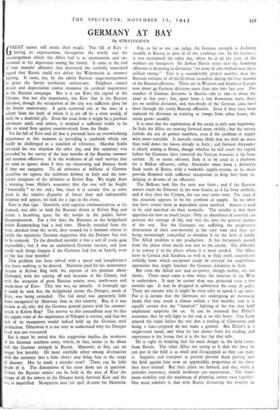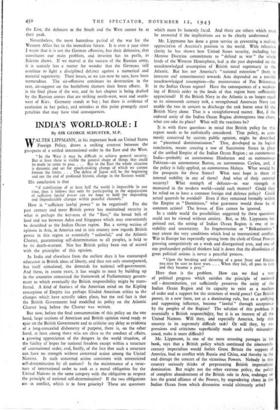GERMANY AT BAY
By STRATEGICUS
GREAT names still retain their magic. The fall of Kiev is having its repercussions throughout the world, and the encouragement which the Allies feel is as spontaneous and un- reasoned as the depression among the enemy. It came at the end of four months' offensive that destroyed the carefully nourished legend that Russia could not defeat the Wehrmacht in summer fighting. It came, too, by the adroit Russian stage-management to grace the Soviet revolution anniversary. Emphasis cannot distort and depreciation cannot minimise its cardinal importance in the Russian campaign. But it is not Kiev, the capital of the Ukraine, that has this importance, not Kiev that is the Russian objective, though the occupation of the city was sufficient glory for the Soviet anniversary. A great scattered city at the nose of a salient from the body of which it is cut off by a river would, of itself, be a doubtful gift. Even the issue from it might be a perilous adventure until, and unless, it attained a sufficient width to be able to stand firm against counter-attack from the flanks.
Yet the fall of Kiev and all that it portends have an overwhelming importance at this moment as providing a yardstick which can hardly be challenged as a standard of reference. Marshal Stalin surveyed the war situation the other day, and this summary was preceded by the survey of the four months of the Russian summer and autumn offensive. It is the weakness of all such surveys that we tend to ignore them if they are chastening and distrust them if they are sanguine. To all estimates of millions of German casualties we oppose the stubborn defence in Italy and the tem- porary recapture of the initiative at Krivoi Rog. We might draw a warning from Hitler's assurance that the war will be fought " fanatically " to the end ; but, since it is certain that at some point in the relative disparity of forces clear and indisputable evidence will appear, we look for a sign in the event.
Kiev is that sign. Manstein, with superior communications at his disposal, was able to hold the Russian thrust at Krivoi Rog and secure a breathing space for the troops in the pocket below Dnepropetrovsk. For a few days the Russians in the bridgehead below Kremenchug had a bad time. Heavily attacked from the west, checked from the south, they seemed for a moment almost to justify the optimistic German suggestion that the Dnieper line was to be restored. To the detached outsider it was a sort of credo quia zmpossibile ; but it was an undoubted German success, and how could such things happen if the Germans had lost so heavily even in the last four months?
That problem has been solved with a speed and completeness that leave nothing to be desired. Manstein paid for his momentary success at Krivoi Rog with the capture of his position about Melitopol, with the cutting off and invasion of the Crimea, and with the irruption of great Russian armies west, north-west and south-west of Kiev. This last was no miracle. A fortnight ago it could be seen that the bridgehead across the Dnieper, north of Kiev, was being extended. The full detail was apparently little more recognised by Manstein than in this country. But, if it was known at all, why did the German general persist with his counter- attack at Krivoi Rog? The answer to this conundrum may be that the expert view of the importance of Nikopol is correct, and that the lack of its manganese would indeed hold up the German steel production. Otherwise it is not easy to understand why the Dnieper bend was not evacuated.
But it must be noted that this suggestion implies the weakness of the German southern army, which, in fact, seems to be about half the German strength in Russia. Manstein, in fine, can no longer live lavishly. He must carefully select among alternatives with the certainty that a false choice may bring him to the verge of disaster. Has he made a mistake now? There can be little doubt of it. The dimensions of his error alone are in question. Unless the Russian armies can be held in the area of Kiev the escape of all the armies in the Dnieper bend, between Kiev and the sea, is imperilled. Manganese may yet spell disaster for Manstein.
For, as far as one can judge, the German strength is declining steadily in Russia, in spite of all the combings out. In the factories, it was mentioned the other day, about 8o or 90 per cent. of the workers are foreigners. Sir Arthur Harris states that the bombing offensive is detaining in Germany "an army of able-bodied men three million strong." This is a considerably greater number than the Russian estimate of all the German casualties during the four months of the Russian offensive. There are in Western and Southern Europe now about 4o German divisions more than this time last year. The number of German divisions in Russia-18o to 19o—is about the same as last year ; but, apart from a few Rumanian units, there are no satellite divisions, and two-thirds of the German units have
been through the costly Russian offensive. Even if they have been replaced by divisions in training or troops from other fronts, the strain grows steadily.
It is clear that the exploitation of the strain is only now beginning. In Italy the Allies are moving forward more swiftly ; but the terrain forbids the use of greater numbers, even if the problem of supply were more tractable It scarcely seems likely that we shall do more than hold down the forces already in Italy ; and General Alexander is clearly aiming at Rome, though whether he will reach the capital before the Germans have removed the Vatican treasures is far from certain. If, as seems obvious, Italy is to be used as a platform for a Balkan offensive, either Alexander must form a defensive flank north of Rome, with a workable supply-system, or he must provide Rommel with sufficient occupation to keep him from in- dulging in dreams of an offensive.
The Balkans look like the next war front ; and if the Russian armies reach the Dniester in the near future, as is far from unlikely, and if they clear the Crimea, the cue may come soon. The crux of the situation appears to be the problem of supply. In no other war have armies been so dependent upon materiaL Armies it used to be said marched on their stomachs. The trouble is that their appetites are now so much larger. Only an abundance of material can prevent the wastage of life, and this fits into the general picture of the war. For the Germans are suffering the progressive destruction of their war-material at the very time that they are being increasingly compelled to abandon it on the field of battle.
The Allied problem is not production. It has fortunately passed from the phase when much was lost to the enemy. The difficulty is to convey it to the places where it is most needed. The Allies have in Corsica and Sardinia, as well as in Italy itself, magnificent airfield% from which sea-power could be covered for amphibious operations that might fracture the German defensive in Italy.
But even the Allied sea- and air-power, though mobile, are not elastic. There must come a time when the invasion of the West is undertaken. It may be sooner than was projected even a few
months ago. It may be designed to administer the coup de grace. There are reasons why it might be even safer to speed it up more.
For it is certain that the Germans are undergoing an increasing strain that may reach a climax within a few months, and it is equally certain that the " fanatical " fighting of the war may hold unpleasant surprises for us. It can be assumed that Hitler's assurance that he will fight to the end is no idle boast. Von Leeb uttered the taunt before the war that a reading of Clausewitz and being a lance-corporal do not make a general. But Hitler's is a single-track mind, and what he has drawn from his reading and experience is the lesson that it is the last lap that tells.
He is right in thinking that his main danger in the field comes from Russia. The other Allies are seeing to it that the force he can put in the field is as small and ill-equipped as they can make it. Supplies and transport at present prevent them putting into the field against him even an appreciable proportion of the force they have trained. But their plans are formed, and this, while it provides assurance, should moderate our expectation. The maxi- mum mobility and the maximum of planning cannot exist together. Our main comfort is that with Russia devouring the reserves in the East, the defences in the South and the West cannot be at their peak.
Nevertheless, the most hazardous period of the war for the Western Allies lies in the immediate future. It is over a year since I wrote that it is not the German offensive, but their defensive, that constitutes our main problem, and invasion has its perils, as Salerno shows. If we marvel at the success of the Russian army, it is scarcely less a matter for wonder that the Germans still continue to fight a disciplined defence against a numerical and material superiority. Their losses, as we can now be sure, have been tremendous. The air-offensive continues its destruction in the rear, air-support on the battlefront shatters their finest efforts. It is the final phase of the war, and its last chapter is being drafted by the Russian armies that are striking north-west, west and south- west of Kiev. Germany stands at bay ; but there is evidence of confusion in her policy, and mistakes at this point promptly exact penalties that may have vital consequences.



























 Previous page
Previous page